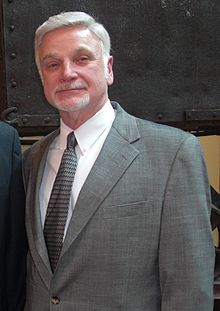Cecil Roberts (unionist)
| Cecil Roberts | |
|---|---|

Roberts in 2009
|
|
| Born |
October 31, 1946 Kanawha County, West Virginia, U.S. |
| Nationality | American |
| Alma mater | West Virginia University Institute of Technology |
| Occupation | Miner; Labor leader |
| Known for | President, United Mine Workers of America |
Cecil Roberts (born October 31, 1946) is a miner and president of the United Mine Workers of America (UMWA). He is also a vice president of the AFL-CIO, and sits on the AFL-CIO's executive council.
Roberts was born on Halloween in 1946. He grew up along Cabin Creek in Kanawha County, West Virginia.
After serving in the United States military and doing a tour of duty in the Vietnam War, Roberts went to work as a miner in 1971. He became active in Miners for Democracy, the reform movement in the United Mine Workers which sprung up around miner Arnold Miller. In 1977, he was elected vice president of District 17.
In 1982, Roberts was elected vice president of UMWA. His running mate was Richard Trumka, who became the union's president.
Roberts graduated from the West Virginia Institute of Technology with a bachelor's degree in 1987.
In 1989, Roberts was the on-site leader and strategist and chief negotiator in UMWA's 10-month strike against Pittston Coal.
When Trumka resigned the presidency of UMWA on December 22, 1995, after being elected secretary-treasurer of the AFL-CIO, Roberts assumed the presidency in his stead.
In 1996, Roberts won agreement from coal mine operators to re-open UMWA's national coal agreement. It was the first time the contract had been re-opened in the union's history, and Roberts won substantial wage increases.
In 1997, Roberts was elected president of UMWA in his own right to a new five-year term. For the first time in UMWA history, the entire leadership team slate ran unopposed.
In 1998, Roberts negotiated a new national coal agreement.
In 2000, Roberts won re-election a second time. Although his term was not due to expire, delegates to UMWA's March 2000 convention approved a resolution to move the election up so balloting would not coincide with negotiations for a new bituminous coal contract. Again, Roberts and his slate ran unopposed.
...
Wikipedia
